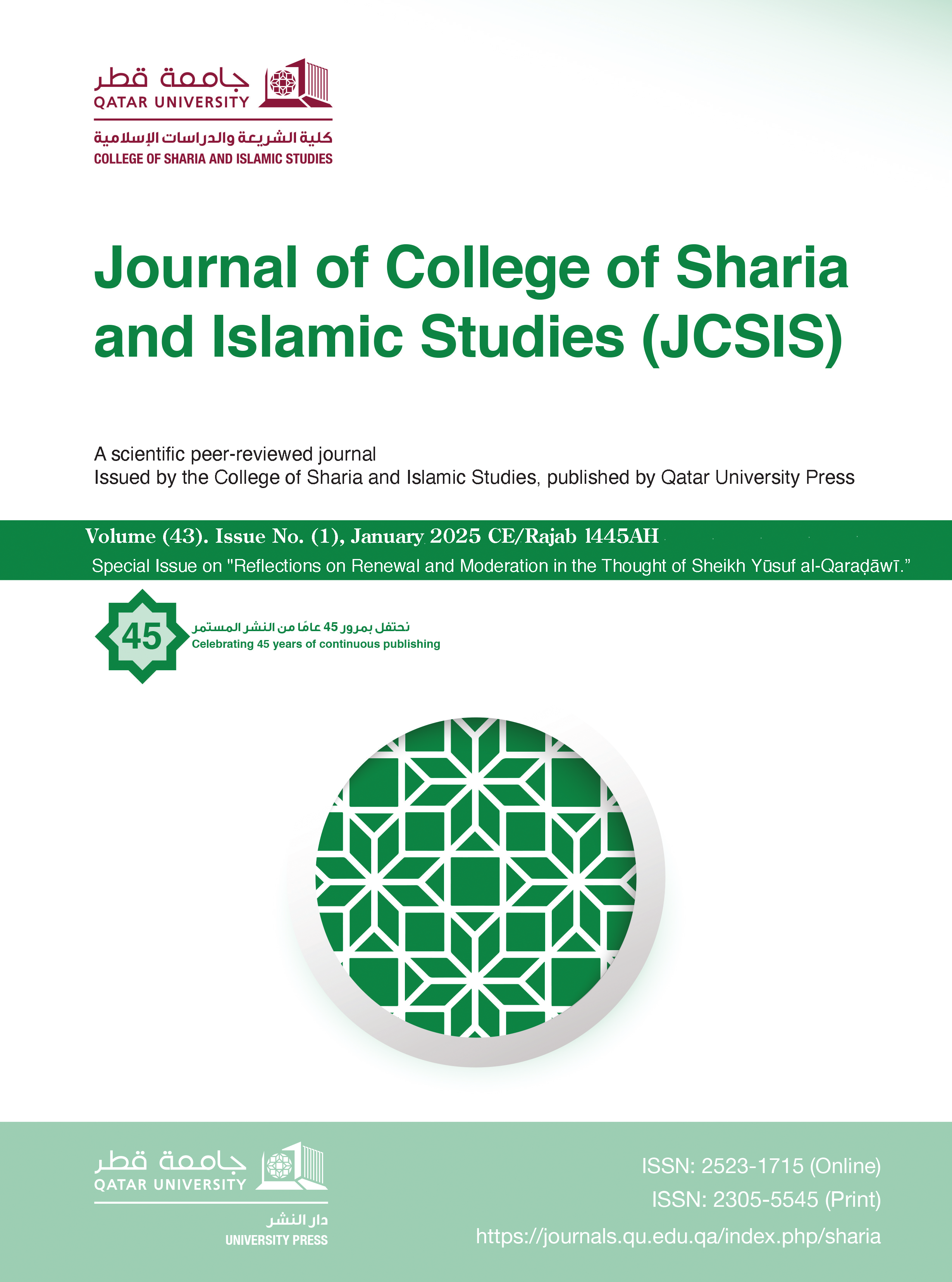Aspects of Maqāṣid-Based Renewal and Its Impact on Fatwas Involving Women and the Family by Sheikh Yūsuf al-Qaraḍāwī
Abstract
Objectives: This study aims to clarify the essence of maqāṣid-based renewal (renewal based on the higher objectives of the Sharia), examine Sheikh Yūsuf al-Qaraḍāwī’s approach in this field, highlight his most significant contributions, and assess the effectiveness of these contributions in addressing issues related to women and the family.
Methodology: This study employs a descriptive method to detail definitions, rulings, and fatwas, an inductive method to trace statements on maqāṣid to form a comprehensive view of the Sheikh’s contributions, and an analytical method to examine the definition and manifestations of maqāṣid-based renewal, and its application in family and women’s issues.
Results: The outcome of this study is that independent reasoning (ijtihād) based on the higher objectives (maqāṣid) of the law is one of the most effective ways to renew Islamic society. It affirms the suitability of Islamic law for all times and places and is essential for advancing the progress of ijtihād. A safeguard against misplaced calls for innovation or abrogation, it preserves or awakens what we would naturally be inclined to do. These are the very objectives that the contributions of the Sheikh sought to achieve.
Originality: Maqāṣid-based ijtihād was known to early scholars, and contemporary legal experts have increasingly adopted it as a method for deriving rulings. The approach was illustrated with examples from Sheikh al-Qaraḍāwī’s fatwas on women and the family, which, despite extensive discussion over time, have rarely been presented convincingly as the Sheikh managed to do, establishing the necessity of its application in addressing future issues in society.
Metrics
##plugins.themes.bootstrap3.article.details##
Maqāṣid-based renewalQaraḍāwīFamilyWomen
Al-Bukhārī, Abū ʿAbd Allāh Muḥammad b. ʾIsmāʿīl. Al-Jāmiʿ al-Ṣaḥīḥ (in Arabic), ed. Jamāʿa min al-ʿUlamāʾ. Cairo: al-Maṭbaʿa al-Amīriya al-Kubrā, 1311AH.
Al-Ghazālī, Abū Ḥāmid Muḥammad b. Muḥammad. Al-Mustaṣfā Min ʿIlm al-ʾUṣūl (in Arabic).
Al-Ḥākim, Abū ʿAbd Allāh Muḥammad b. ʿAbd Allāh. Al-Mustadrak ʿAla al-Ṣaḥīḥayn (in Arabic), ed. Muṣṭafā ʿAbd Al-Qādir ʿAṭā. Beirut: Dār al-Kutub al-ʿIlmiya, 1411AH/1990AD.
Al-ʿIzz, Abū Muḥammad ʿIzz al-Din b. ʿAbd al-Salām. Qawāʿid al-Aḥkām Fi Maṣāliḥ al-Anām (in Arabic), ed. ʿAbd al-Raʾūf Ṭaha Ṣaʿd, Cairo: Maktaba al-kulliyāt al-Azhariya, 1414AH/1991AD.
al-Muṣliḥ, Muḥammad Abū Bakr, "The Five Purposes of Creation and the Authentic Essence of Tarbiya "Education": A Study in Light of the Holy Qur’an (in Arabic), Journal of College of Sharia and Islamic studies, Qatar University, Vol. 38, No. 2 (2021), https://doi.org/10.29117/jcsis.2021.0273
Al-Qaraḍāwī, Abū Muḥammad Yūsuf ʿAbd Allāh. ʾAwlawiyāt al-Ḥaraka al-Islāmiya (in Arabic), Cairo: Maktaba Wahba, 1990.
Al-Qarāfī, Shihāb al-Dīn Aḥmad b. ʾIdrīs. Nafāʾis al ʾUṣūl Fī Sharḥ al-Maḥṣūl (in Arabic), ed. ʿĀdil Aḥmad ʿAbd al-Mawjūd, ʿAlī Muḥammad al-Muʿawwaḍ, Maktaba Nizār Muṣṭafā al-Bāz, 1416AH/1995AD.
–––. Dirāsa Fī Fiqh Maqāṣid al-Sharīʿa Bayn al-Maqāṣid al-Kulliya Wa al-Nuṣūṣ al-Juzʾiya (in Arabic), 3rd ed., Cairo: Dār al-Shurūq, 2008.
–––. Fatāwā al-Marʾa al-Muslima (in Arabic), Cairo: Maktaba Wahba, [n.d].
–––. Fiqh al-ʾUsra Wa Qaḍāyā al-Marʾa (in Arabic), Turkiyā: al-Dār al Shāmiya, 1st ed., 1438AH/2017AD.
–––. Fī Fiqh al-ʾAwlawiyāt (in Arabic), Cairo: Maktaba Wahba, 2nd ed., 1416AH/1996.
–––. Kayfa Nataʿamal Maʿa al-Sunna al-Nabawiya (in Arabic), Cairo: Dār al-Shurūq, 2nd ed., 1423AH/ 2002 AD.
–––. Madkhal Limaʿrifat al-ʾIslām (in Arabic), Cairo: Maktaba Wahba.
Al-Ṭabarānī, Abū al-Qāsim Sulaymān Ibn Aḥmad. Al-Muʿjam al-Kabīr (in Arabic), ed. Ḥamdī b. ʿAbd al-Majīd al-Salafī, 2nd ed., Cairo: Maktaba Ibn Taymiya, [n.d].
Muslim, Abū al-Ḥusayn b. Al-Ḥajjāj. Ṣaḥīḥ Muslim (in Arabic), ed. Muḥammad Fuʾād ʿAbd al-Bāqī, Beirut: Dār ʾIḥyāʾ al-Turāth al-ʾArabī, 1431AH.
****************************************************************************************
الآمدي، على بن محمد. الإحكام في أصول الأحكام. الرياض: مؤسسة النور، ط1، 1387هـ.
البخاري، أبو عبد الله محمد بن إسماعيل. الجامع الصحيح. تحقيق جماعة من العلماء. مصر: المطبعة الأميرية الكبرى، 1311هـ.
الحاكم، أبو عبد الله محمد بن عبد الله. المستدرك على الصحيحين بتعليقات الذهبي. تحقيق مصطفى عبد القادر عطا. بيروت: دار الكتب العلمية، ط1، 1411هـ/1990م.
الطبراني، أبو القاسم سليمان بن أحمد. المعجم الكبير. تحقيق حمدي بن عبد المجيد السلفي. القاهرة: مكتبة ابن تيمية، ط2.
العز، أبو محمد عزالدين بن عبد السلام. قواعد الأحكام في مصالح الأنام. مراجعة وتعليق عبد الرؤوف طه صعد. القاهرة: مكتبة الكليات الأزهرية، 1414هــ/1991م.
الغزالي، أبو حامد محمد بن محمد. المستصفى من علم الأصول.
القرافي، شهاب الدين أحمد بن إدريس. نفائس الأصول في شرح المحصول. تحقيق: عادل أحمد عبد الموجود؛ علي محمد المعوض. مكتبة نزار مصطفى الباز، 1416هــ/1995م.
القرضاوي، أبو محمد يوسف عبد الله. أولويات الحركة الإسلامية. القاهرة: مكتبة وهبة، 1990م.
–––. دراسة في فقه مقاصد الشريعة بين المقاصد الكلية والنصوص الجزئية. القاهرة: دار الشروق، ط3، 2008م.
–––. فتاوى المرأة المسلمة. القاهرة: مكتبة وهبة.
–––. فقه الأسرة وقضايا المرأة. تركيا: الدار الشامية، ط1، 1438هــ/2017م.
–––. في فقه الأولويات. القاهرة: مكتبة وهبة، ط2، 1416هــ/1996م.
–––. كيف نتعامل مع السنة النبوية. القاهرة: دار الشروق، ط2، 1423هــ/2002م.
–––. مدخل لمعرفة الإسلام. القاهرة: مكتبة وهبة، [د.ت].
محمد، أبو بكر المصلح. «مقاصد الخلق الخمسة وجوهر التربية الأصيل». مجلة كلية الشريعة والدراسات الإسلامية. قطر، مج38، ع2 (2021)، https://doi.org/10.29117/jcsis.2021.0273
مسلم، أبو الحسين مسلم بن الحجاج. صحيح مسلم. تحقيق محمد فؤاد عبد الباقي. بيروت: دار إحياء التراث العربي، 1431هـ.


